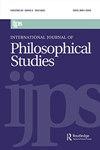思想的新场景:论沃尔多的经验体现
IF 0.6
3区 哲学
0 PHILOSOPHY
INTERNATIONAL JOURNAL OF PHILOSOPHICAL STUDIES
Pub Date : 2023-03-15
DOI:10.1080/09672559.2023.2250180
引用次数: 0
摘要
在《体验的体现》一书中,安妮克·沃尔多对近代早期对体验概念的传统解释方式提出了挑战和重新构想。传统上,评论家强调早期现代人对第一人称视角的看法,并回避我们的化身与他们认识论观点的相关性。我在这里的重点是沃尔多关于休谟的那一章,她在其中分析了休谟对我们反思性道德判断能力的描述,认为他认为这是自然的,尽管我们的具体社会经验以无数种方式影响着它。在详细介绍了Waldow的贡献之后,我澄清、证实并批评了它们。因为我认为沃尔多在她的解释性努力上取得了广泛的成功,我认为她破坏了早期现代经验的传统解释性方法,但并不是说她把我们从认识论转向了其他视角。相反,沃尔多应该被理解为表明,至少在休谟的元伦理学的情况下,认识论是具体化的,是社会的,既是认知的,也是感性的。本文章由计算机程序翻译,如有差异,请以英文原文为准。
A New Scene of Thought: On Waldow’s Experience Embodied
ABSTRACT In her book Experience Embodied, Anik Waldow challenges and reimagines the traditional interpretative approach to the concept of experience in the early modern period. Traditionally, commentators have emphasized early moderns’ views on the first-person perspective and eschewed the relevance of our embodiment to their epistemological outlooks. My focus here is on Waldow’s chapter on Hume, wherein she analyzes Hume’s account of our capacity for reflective moral judgment, arguing that he understands it as natural despite the countless ways in which our embodied social experiences impinge on it. After detailing Waldow’s contributions, I clarify, corroborate, and criticize them. Since I contend that Waldow is broadly successful in her interpretative efforts, I suggest that she undermines the traditional interpretative approach to experience in the early modern period, but not in the sense that she moves us away from the epistemological towards other lenses. Rather, Waldow should be understood as showing that, at least in the case of Hume’s metaethics, the epistemological is embodied, is social, and is both cognitive and sentimental.
求助全文
通过发布文献求助,成功后即可免费获取论文全文。
去求助
来源期刊

INTERNATIONAL JOURNAL OF PHILOSOPHICAL STUDIES
PHILOSOPHY-
CiteScore
0.90
自引率
0.00%
发文量
29
期刊介绍:
The International Journal of Philosophical Studies (IJPS) publishes academic articles of the highest quality from both analytic and continental traditions and provides a forum for publishing on a broader range of issues than is currently available in philosophical journals. IJPS also publishes annual special issues devoted to key thematic areas or to critical engagements with contemporary philosophers of note. Through its Discussion section, it provides a lively forum for exchange of ideas and encourages dialogue and mutual comprehension across all philosophical traditions. The journal also contains an extensive book review section, including occasional book symposia. It also provides Critical Notices which review major books or themes in depth.
 求助内容:
求助内容: 应助结果提醒方式:
应助结果提醒方式:


